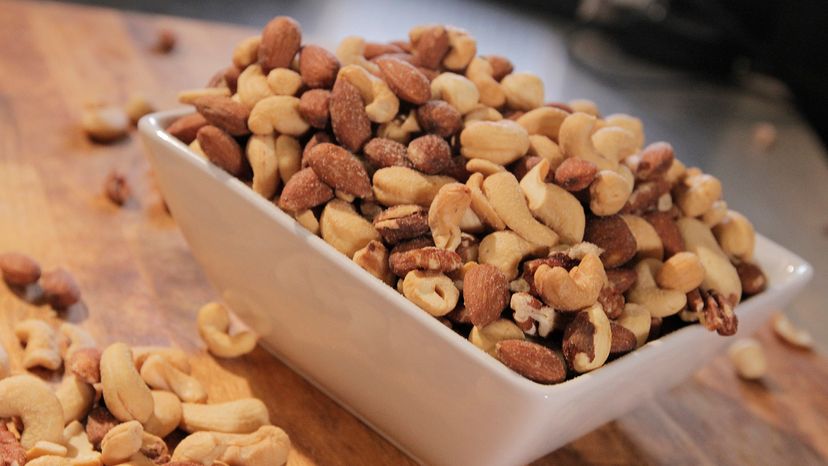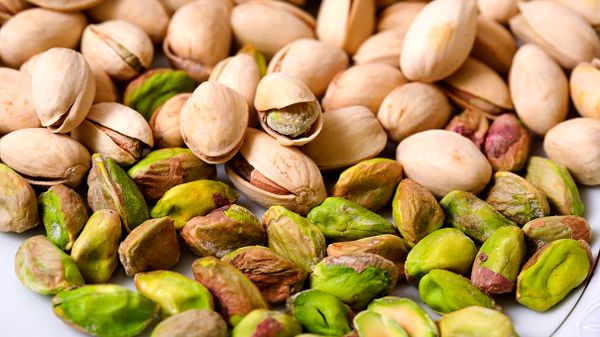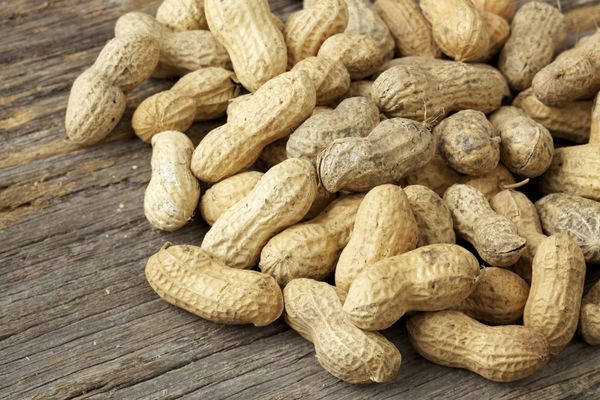
They're delicious, convenient, and — unless you're allergic — among the most satisfying snack foods out there. But even if all that isn't enough to convince you to go nuts for nuts, some new research might: According to the American Heart Association, swapping one serving of nuts every day in place of less healthy fare could help keep your heart healthy and your weight stable.
The nut-centric news comes from the American Heart Association's Scientific Sessions 2018, a Chicago event for researchers and clinicians highlighting advances in cardiovascular science. One study presented at the conference examined the impact of nuts and peanuts on long-term body weight. Researchers found that men and women who ate one 1-ounce (28-gram) serving of any type of nut or peanut in place of a less nutritional option (think processed meat, french fries or dessert) had a lower risk of long-term weight gain and obesity. One daily serving of nuts or peanuts (1 ounce or 2 tablespoons of nut butter) was linked to a lower risk of weight gain and obesity over each four-year interval of study, as was substituting one daily serving in place of those less nutrition options.
Advertisement
"People often see nuts as food items high in fat and calories, so they hesitate to consider them as healthy snacks, but they are in fact associated with less weight gain and wellness," lead author Xiaoran Liu, Ph.D., said in a statement.
The participant pool was pretty sizable (three separate groups of 25,394 men in the Health Professionals Follow-up Study, 53,541 women in the Nurse's Health Study, and 47,255 women in the Nurse's Health Study II), and while they were mostly white health professionals, the researchers believe the findings could be applicable to a more general population.
"Once people reach adulthood, they start to gradually gain about 1 pound [.45 kilograms] a year of weight, which seems small," Liu said. "But if you consider gaining 1 pound over 20 years, it accumulates to a lot of weight gain. Adding 1 ounce of nuts to your diet in place of less healthy foods may help prevent that slow, gradual weight gain after you enter adulthood and reduce the risk of obesity-related cardiovascular diseases."
So just how many nuts is in 1 ounce (28 grams)? Not too many. Cleveland Clinic actually breaks it out into rough estimates, right down to about how many nuts are in one, 1-ounce (28-gram) serving: 24 almonds, 18 medium cashews, 12 hazelnuts, 12 macadamia nuts, 35 shelled peanuts, 15 pecan halves and 14 English walnut halves.
A separate study funded through an American Heart Association grant found that Brazil nuts in particular pack a powerful punch. Researchers at San Diego State University asked 20 women and two men, all age 20 or older and with a mean body mass index of 22.3 to add either 1.2 ounces (36 grams) of pretzels or 0.7 ounce (20 grams) of Brazil nuts (about five) to their regular diets. Although the two snack options are roughly equivalent in terms of calories and sodium, they seemed to have different effects. Both the nut and pretzel eaters reported feeling significantly less hungry, but the Brazil nut consumers experienced a greater sense of fullness. And those who snacked on pretzels saw a significant spike in blood glucose and insulin 40 minutes after eating; those who ate the nuts didn't have a significant spike at all.
"While both Brazil nuts and pretzels increased a sense of fullness after they were eaten, eating Brazil nuts stabilized postprandial (after eating) blood glucose and insulin levels, which may be beneficial in preventing diabetes and weight gain," senior author Mee Young Hong, Ph.D., R.D. said in a statement. "Our study allows researchers and clinicians to consider the possible beneficial role of Brazil nuts to help people feel full and maintain a healthy level of glucose, reducing the risk of obesity and diabetes."
This study had limitations too, of course — for one thing, only 9 percent of the participants were male, so it's unclear whether results apply to the general population. But incorporating a few Brazil nuts to your daily diet may not be a bad idea (again, only if you're not afflicted by an allergy): They're one of the highest-known food sources of a mineral called selenium, that researchers have previously suspected could be connected to insulin and glucose regulation, which is important for heart health. Nutty, right?
Advertisement


